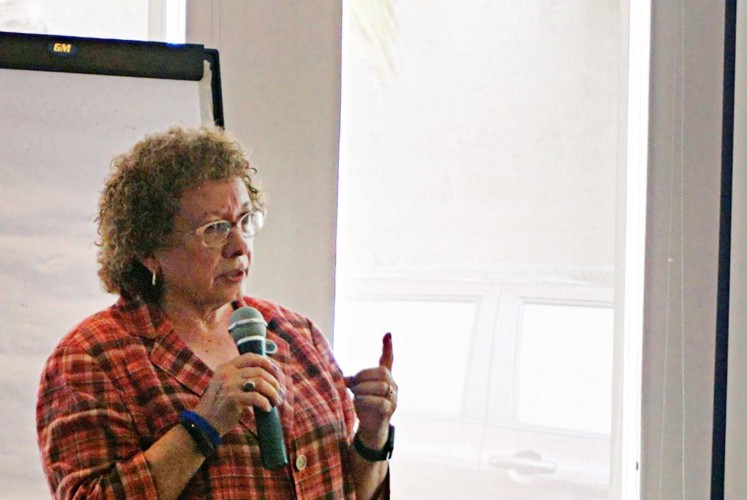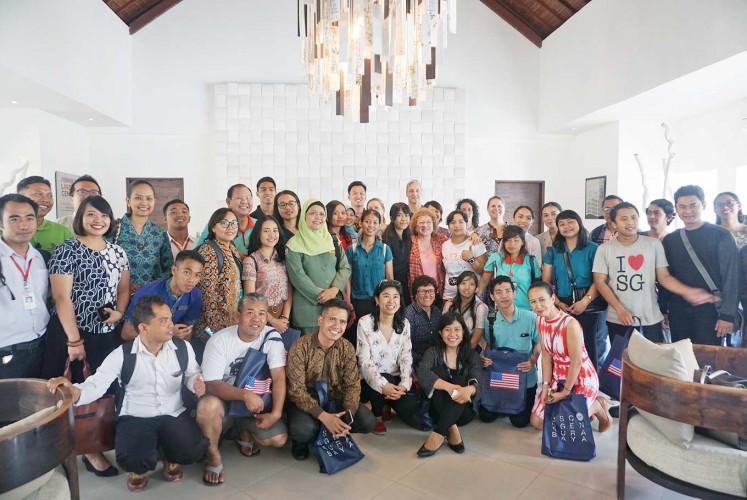Popular Reads
Top Results
Can't find what you're looking for?
View all search resultsPopular Reads
Top Results
Can't find what you're looking for?
View all search resultsDestroying disability stigma
“Stigma is the big problem. People are looking down on them. They feel different. We don’t want pity, we want paychecks, we want work,” Joyce Bender said.
Change text size
Gift Premium Articles
to Anyone
Remember, we may be healthy now and sit in a wheelchair the next moment.
Joyce Bender, the president and CEO of Bender Consulting Services, an internationally recognized leader in disability employment, reminded us about the possibility that we might become a part of the disabled community in the future.
She believes that everyone is now temporarily able. There could be an accident or illness that might cause the loss of physical abilities or lead to physical handicaps, forcing one to use a wheelchair, for example. That is why people should join forces to eradicate the stigma associated with the disability community.
“Stigma is the big problem. People are looking down on them. They feel different. We don’t want pity, we want paychecks, we want work,” she said.
Through her consulting firm, Bender has over 20 years of experience channeling disabled people to the public and private sectors. She was in Denpasar, Bali, last year, to talk at a forum attended by companies and institutions in Bali that had employed people with disabilities.
Joyce Bender, the president and CEO of Bender Consulting Services, an internationally recognized leader in disability employment, reminded us about the possibility that we might become a part of the disabled community in the future. (JP/Luh De Suriyani)Facilitated by the Consulate General of the United States, Surabaya, the forum, which was attended by 15 companies, was held at the Annika Linden Center, a community empowerment center for social entrepreneurs and NGOs in Denpasar.
Bender called people who hired people with disabilities champions for having freed them from the stigma of being unproductive.
“You are a champion,” she said during the session.
Bender shared her story of how she worked towards creating a bridge between employers and disabled job seekers. In 1985, she had a cerebral hemorrhage, brought on by epilepsy, which required brain surgery. It left her with 60 percent hearing in one ear and the awareness that she had epilepsy.
The incident happened when she was watching a film at home. The movie was long and after taking a break she decided to buy popcorn. She had convulsions, fell down and fainted, which resulted in a severe head injury.
“I was in a coma and had to undergo surgery or die,” she recalled.
After recovering, Bender has since strived to ensure that people with disabilities find work in all sectors, including elite institutions in the US such as the National Security Agency (NSA).
In 1999, she received the President’s Award from former president Bill Clinton and in 2003 she was given the Bush administration’s New Freedom Initiative Award.
“You cannot be discriminative because of disabilities. Epilepsy is only part of my identity,” said the host of Disability Matters with Joyce Bender, a weekly internet talk radio show on voiceamerica.com.
Stronger: President and CEO of Bender Consulting Services Joyce Bender (center right, second row) poses with participants of the sharing session at the Annika Linden Center in Denpasar, Bali. (JP/Luh De Suriyani)During the sharing session with Bender, a representative from the Alila Seminyak hotel chain shared videos of how Sudi Arsana, a deaf employee, interacted with his co-workers. His peers are now learning sign language.
Bagus Jelantik, Alila Seminyak’s room division manager, said for a year Sudi had worked in a sales unit store and made headway as a room attendant. “We do not have a lot of difficulties. We share love, texting with paper.”
In Bali, there are communities and platforms that help people with disabilities to gain access to the workplace. The Dnetwork organization, for example, provides a platform for prospective employers and businesses to inform the community about job opportunities.
Two physically disabled Alfamart workers in Bali, Ketut Santiyara and July, were proud to share how they joined the company.
“I followed the usual work procedure like an interview, briefing, psychological test and job training,” Santiyara said.
There were also many other heartwarming stories from other employees.
Adi, a deaf waiter at the Fairmont Hotel in Sanur, said he was working in the breakfast room one day when a guest asked for some fruit. Because the guest did not realize he was deaf, Adi took a piece of paper and pen and asked the guest to draw the requested fruit. The guest got his fruit, felt happy and respected the way Adi worked.
The sharing experience with Bender boosted the spirit to break the stigma of disability.
All business representatives, who attended the forum, stated that their disabled workers had been doing their jobs with good manners, completed their work on time and took part in providing solutions.













